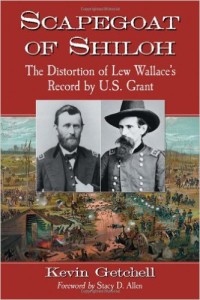 Scapegoat of Shiloh: The Distortion of Lew Wallace’s Record by U.S. Grant. By Kevin Getchell, McFarland, 2013 ISBN-10: 078647209X; ISBN-13: 978-0786472093
Scapegoat of Shiloh: The Distortion of Lew Wallace’s Record by U.S. Grant. By Kevin Getchell, McFarland, 2013 ISBN-10: 078647209X; ISBN-13: 978-0786472093
At least three books published in 2013 have severely challenged one of the standard versions of Civil War history: that Ulysses S. Grant was beset on all sides by his subordinates’ incompetence. While Frank Varney reassessed that general’s relationship with William S. Rosecrans in General Grant and the Rewriting of History and Diane Monroe Smith in Command Conflicts in Grant’s Overland Campaign did the same for Gouverneur K. Warren, Kevin Getchell has taken on the controversy between Grant and Lew Wallace over the latter’s indirect march to the Shiloh battlefield on April 6, 1862 in his Scapegoat of Shiloh: The Distortion of Lew Wallace’s Record by U.S. Grant.
This book aptly details how General Grant and his supporters scapegoated Wallace to cover up Grant’s own blunders–such as his late arrival at Pittsburg Landing–and presents a multitude of misrepresentations they employed in doing so. Mr. Getchell particularly criticizes Grant’s use of the army’s quartermaster, Algernon Baxter, to carry orders to Wallace at Crump’s Landing that morning, given the supply problems which federal troops encountered throughout the day. In fact, the book spends at least as much time analyzing the effect of Grant’s mishandling of this staff-member as it does on the undue derogation of Wallace’s generalship.
Although the author’s arguments run up against the dearth of information regarding the flow of ammunition to the front lines and the activities of the various officers on the field of battle, he clearly demonstrates that many units ran low on cartridges or cannonballs throughout the day, challenging the notion that Grant quickly and effectively started the supply trains rolling. One can only speculate about the subsequent ill-effect on combat as individual regiments, even whole brigades, withdrew in order to restock the men’s pouches. An important document in Mr. Getchell’s possession and reproduced here is an order from April 6th to “Send all teams available to Steamer Rocket [the ordnance storeship] to haul ammunition to the field immediately.” Quartermaster Baxter’s name and the initials of one of McClernand’s lieutenant-colonels appeared on the bottom. The author posits that these supplies helped buttress the right wing under McClernand and Sherman at the expense of the federal left.
The author’s treatment has a tendency to shift back and forth chronologically and thematically.Many of the book’s topics are repeated, such as the extent of Baxter’s duties and the impact of his absence. The author does, however, provide many other unusual and interesting nuggets of information, apart from his main subject. An excerpt from an article in a small-town Wisconsin newspaper contained a mortality figure for the local regiment doubling the published number (confirmed by Bev Hetzel’s examination in Wisconsin Deaths at Shiloh, Tennessee) and indicating how the war’s tremendous cost probably mounted much higher than the already appalling official statistics. Among the images of previously unpublished materials is a voucher for over sixty-seven tons of corn “to Build breastworks near Pittsburgh Landing” on the first day of the battle. The reference to a brigade commander’s Black servant who provided Ulysses Grant “some curious liquid supply assistance” originated from a first-person, but apparently unreliable, account detailing how the General downed a pint of whiskey on April 6th but remained “perfectly sober at the battle.”
Mr. Getchell makes many telling points against Grant. The General only mentioned choosing a quartermaster on his staff to deliver the message to Lew Wallace, as opposed to identifying Baxter as the quartermaster of his army. Instead of sending him on the errand immediately after landing, Grant apparently met General W.H.L. Wallace nearer the front, or about a half-mile from the landing, before dispatching his aide. Grant, for some reason, left Baxter’s name off the list of personal staff in his early, and inadequate, official report of the battle.
The author’s thesis is strengthened by the portion of Baxter’s post-war letter which was omitted from Battles and Leaders of the Civil War. The former quartermaster wrote: “I had received no orders that morning from Gen. Grant previous to leaving for Crump’s Landing, and had no opportunity to speak with him until late that afternoon.” This alone goes a long way in explaining the difficulties in supplying ammunition to the Union soldiers on the first day of battle. By focusing on a seemingly insignificant episode, Mr. Getchell’s book has illuminated some of the many shortcomings of the Union commander during the Battle of Shiloh.
